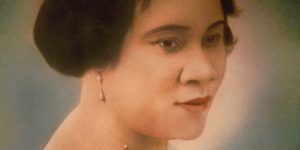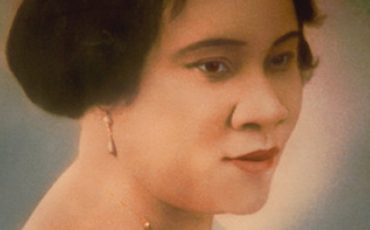 African American beauty entrepreneur Madam C. J. Walker, originally named Sarah Breedlove, was born in 1867 in Delta, Louisiana, to sharecropper parents who had recently been freed from slavery. Walker experienced considerable hardship in the early years of her life. Orphaned at the age of seven and obliged to live with her older sister and an unkind brother-in-law, Walker married Moses McWilliams when she was 14 and lived with him and their daughter Lelia in Vicksburg, Mississippi, until Moses died in 1888. In 1889, Walker moved to St. Louis and, like many African American women at the time who needed to earn a living while caring for small children, worked as a laundress in her home.
African American beauty entrepreneur Madam C. J. Walker, originally named Sarah Breedlove, was born in 1867 in Delta, Louisiana, to sharecropper parents who had recently been freed from slavery. Walker experienced considerable hardship in the early years of her life. Orphaned at the age of seven and obliged to live with her older sister and an unkind brother-in-law, Walker married Moses McWilliams when she was 14 and lived with him and their daughter Lelia in Vicksburg, Mississippi, until Moses died in 1888. In 1889, Walker moved to St. Louis and, like many African American women at the time who needed to earn a living while caring for small children, worked as a laundress in her home.
Creating Opportunity
In 1894, Walker married John Davis, and theirs was an unhappy union that had ended in separation by 1903. After more than 10 years of backbreaking labor as a washerwoman, Walker was frustrated with the lack of economic opportunity and distressed at how stress and lack of proper care had given her short, brittle hair, bald spots, and a dry scalp. When relating the story of her entry into the hair care industry, Walker claimed that the formula for her Wonderful Hair Grower came to her in a dream; however, it is more likely that she got the idea for creating her own preparation after she began working as an agent for the Poro company of Annie Turnbo Malone sometime in 1903. Walker became a successful hairdresser and sales agent in St. Louis, focusing mostly on using shampoos and scalp salves to promote hair health, rather than selling the hair straighteners that were becoming more popular at the time. By 1904, Walker had begun to produce her own products and sell them in person and by mail order. Around this time, Sarah Breedlove McWilliams Davis became Madam C. J. Walker when she married newsman Charles Joseph Walker. (They divorced in 1912.) In 1905, the Walkers moved to Denver, where Madam Walker expanded her business. By 1907, they had moved to Pittsburgh, before finally settling in Indianapolis, the city that would become the Madam C. J. Walker Manufacturing Company’s permanent headquarters, in 1919.
Selling Her Own Success
Madam Walker’s business grew steadily through the 1910s. By 1911 she had built a factory, laboratory, and salon in Indianapolis. The mail order business was thriving, due in part to a widespread advertising campaign in African American newspapers that appealed to racial pride as well as touting the effectiveness of the products. Just as important to the Walker company’s success was Madam Walker’s effectiveness at recruiting and training African American women across the United States to do hair and sell her products. In promotional literature and in the lectures that she gave to audiences of black women across the country, Walker emphasized her own humble beginnings and told African American women that they, too, could free themselves from ill-paying, unsatisfying, grueling work, and gain financial independence as beauticians and saleswomen. The message was particularly appealing to working-class black women who had few employment options beyond working as laundresses or domestic servants. As the rolls of Walker agents expanded, reaching 10,000 by 1916, the company built Walker beauty schools in major cities, provided modest insurance through the Walker Clubs it sponsored, and even published a company newsletter. Around this time, Walker expanded her product line to include hair oils designed to straighten hair using a heated iron comb. Publicly, Walker deflected African American critics who accused her of promoting a white beauty ideal by downplaying this growing part of her business, emphasizing instead the effectiveness of her products in improving hair health and her own contributions to the African American community as a businesswoman and a philanthropist.
Quest for Respectability
In spite of her impressive yearly sales (up to six figures by 1916), her army of agents, and her substantial contributions to the YMCA and several African American educational institutions, Walker had a hard time initially gaining respect from black political and business leaders. Educator Booker T. Washington, for example, repeatedly rebuffed her proposals to establish a beauty culture course of study at the Tuskegee Institute and in other contexts expressed disapproval of the beauty industry, going so far as trying to eliminate cosmetic and hair product advertising from newspapers he supported and opposing, for a time, beauty enterprises joining the National Negro Business League (NNBL). In 1912, Madam Walker attended the annual conference of the NNBL, and Washington, who had delivered the keynote address and was presiding over proceedings that included speeches from various successful black business owners, refused to allow her to speak. On the last day of the conference, Walker stood up in the middle of the audience and told her story to enthusiastic applause, but it would be several more years before Washington would publicly recognize Walker’s contribution to black enterprise and the financial betterment of African American women.
In 1916, Walker moved to Harlem and devoted herself to building the national reputation and cohesiveness of her business, including hosting a national Walker agent conference in 1917, as well as throwing herself into the social, cultural, and political life of black New York. In these years, Walker became involved in a number of social activist causes, joining the National Association for the Advancement of Colored People, NAACP, participating in anti-lynching campaigns, and speaking out for civil rights during and after World War I. Walker moved into her Irvington-on-Hudson mansion, Villa Lewaro, in 1918. She died on May 25, 1919, from a long-term kidney illness. At her death, she was the wealthiest black woman in the world. Walker’s daughter, Lelia, became president of the Madam C. J. Walker Manufacturing Company, which continued to be among the most recognized names in the African American beauty industry for many decades.

Leave a Reply